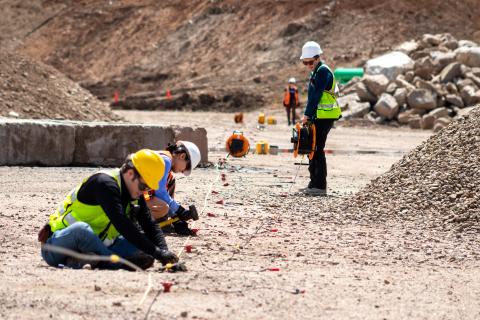All Categories
Featured
Table of Contents
Geophysics in Ascot Australia 2020
Connect with MBA programs looking for prospects like you. Study. Link with master's programs around the country to get an edge over the competition.

A geophysicist research studies numerous aspects of the earth. According to the U.S. Geological Study, they study gravity, magnetic, electrical, and seismic activity occurrences. Geophysicists likewise document, assess, and take measurements of geographic functions and abnormalities. Enjoy a video to learn what a geophysicist: Geophysicists need to earn a minimum of a bachelor's degree; nevertheless, this is for an entry-level position.
If you desire study you should pursue a Ph. D. Undergrad coursework normally includes geology, mathematics, environmental science, or physics. Advanced degrees need more specific research studies in the specialty of option. Areas can consist of oceanography, climatic physics, meteorology, planetary, petroleum, environmental, and mining. Job potential customers are higher if you have a strong background in computer science or technology.
Geophysical Methods in Murdoch WA 2022
Access to these chances may be restricted depending on where you live; nevertheless, internships or summertime programs with geophysical business, university geophysics department, or the U.S. Geological Survey can be alternatives. You can find a list of a list of opportunities on the United States Geological Study (USGS) websites' Path Programs tab (opens in another link).
If you have yet to finish high school, taking as lots of science and mathematics classes as possible would be a plus. Geophysicists also deal with computers while researching, so computer courses can also be valuable, as pointed out previously in this short article. Lots of geophysicists focus on an area of geophysics. Therefore, the job description would alter pending on the specialty.
A geophysicist's duties can consist of determining, tracking, and documenting information from different physical homes on earth. Geophysicists often have to take a trip worldwide to take a look at geological events that have taken place or may have been forecasted.
What Does A Geophysicist Do? in Mount Hawthorn WA 2023
Jay Wellik, a geophysicist, studies volcanos. His area of proficiency in geophysics is looking into why volcanos appear and what indications there may be that an eruption might take place. He tracks seismic activity and after that follows what occurs before, throughout, and after a volcano erupts. Geophysicists generally work full-time hours; however, they frequently work irregular hours, as pointed out formerly.

You can find extra details about Geophysicists along with extra educational materials on the U.S. Geological Survey site (links open in a new window). Laura Stern, of the U.S. Geological Survey at the Gas Hydrates Lab in Menlo Park, California: We make a variety of various hydrates in the lab.
We also make carbon dioxide hydrate, ethane hydrate, lp, a number of different structures. It's about 100 degrees chillier than the temperature at which these hydrate samples would dissociate, when they would break down to ice plus gas on the tabletop.
Career Guide: Geophysicist in Crawley Australia 2021
They look like snow, it looks like compacted snow but honestly, it does include gas inside. It's reverting to ice plus gas and then as the ice would melt as it continues to warm, it will end up being water plus gas.
My name is Steve Kirby, I'm a Geophysicist here at the U.S. Geological Study in Menlo Park. I deal with Laura Stern who is also a Geophysicist in this laboratory that adheres towards the examination of planetary ices and gas hydrates. Gas hydrates in nature happen in extremely remote places and they are extremely complex with the interactions and conditions that they form under and samples that are raised are under some sort of alternation or decay.
This is an uncommon lab and there are just a handful of them worldwide and we are very lucky to be here at the Geological Survey and to have the opportunity of dealing with them. Bureau of Labor Data, U.S. Department of Labor, Occupational Outlook Handbook, Geoscientists. National Center for O * Internet Development.
Geophysical Exploration in Beeliar WA 2020
This video was produced by the government for the U.S. Geological Study. The USGS Gas Hydrates Lab is moneyed by the Department of Energy and the USGS Gas Hydrates Task.
Latest Posts
Geophysical Surveys - U.s. Geological Survey in Wandi Western Australia 2023
Geophysics in Mount Claremont Aus 2020
Geophysical Survey in Casaurina Aus 2020